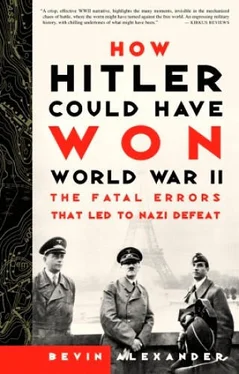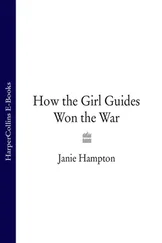Alexander tried to intercept the enemy’s retreat, using a new corps (the 9th) under British General John Crocker to strike on the night of April 7–8 through Fondouk pass, with the aim of driving through Kairouan to Sousse, twenty-five miles south of Enfidaville. Crocker commanded the British 6th Armored Division, a brigade of the British 46th Division, and the U.S. 34th Infantry Division, which had 350 tanks. But the 34th troops were three hours late starting, soon stopped, and took cover. This permitted the enemy to shift fire northward to stop 46th Division. Crocker threw in his 6th Armored tanks to force a passage on April 9. But they took till afternoon to break through fifteen antitank guns and lost 34 tanks. By the time Crocker’s tanks got to Kairouan on April 10, Messe’s army had already passed through. It was a remarkable feat by a few Axis defenders and a sorry show by the Allies, especially 34th Division.
Messe’s army got to Enfidaville by April 11, and linked up with Arnim’s 5th Panzer Army in a hundred-mile arc around Tunis and Bizerte. Even so, the Axis position was hopeless, because German and Italian strength and supplies were declining, while Allied strength was rising.
Just as the Allies poised for a knockout blow, a great dispute threatened to tear the Allies apart. Since 8th Army was coming up the coast from the south, and the British 1st Army was already positioned opposite Tunis and Bizerte on the north, Alexander selected them to smash into the bridgehead and force the Axis surrender. The U.S. 2nd Corps, despite now having 95,000 men, had been neatly pinched off, with no role to play in the victory march. This didn’t sit well with Patton or Bradley, and they complained loudly to Eisenhower, who demanded that 2nd Corps be shifted to the north and strike out on its own for Bizerte.
The 2nd Corps, now under Bradley since Patton was planning for the invasion of Sicily, moved north, 2,400 vehicles a day, driving behind British lines.
The attack opened on April 19, with 8th Army striking northward through Enfidaville toward Tunis, while the British 1st Army made the main effort by attacking April 22 near Medjez el Bab against a 15-mile sector held by only two regiments of the German 334th Division. On the north, Bradley’s 2nd Corps struck on April 23 against Hasso von Manteuffel’s scratch division of 8,000 men.
Allied combat strength was now approaching 300,000 men and 1,400 tanks, while the nine German divisions, backbone of the defense, counted only 60,000 men, and had fewer than 100 tanks.
Thus the Allied attack should have been a walkover. But it wasn’t. Italians and Germans at Enfidaville stopped Montgomery cold. The advance by 1st Army made slow progress against tenacious defense by the two German regiments, then was pushed back by an improvised brigade comprising all the remaining tanks of Army Group Africa. In the north the U.S. 2nd Corps made slow progress through rough country, then found Manteuffel had slipped back to a new line a few miles in the rear. The Allied offensive came to a halt.
But the Axis, because their supply lines had been virtually choked off, were down to only enough fuel to run their vehicles for twenty-five kilometers, while ammunition was sufficient for only three days, and food was getting desperately short.
On April 21, Montgomery suspended his attacks at Enfidaville because of losses, permitting Arnim to shift his armor northward to stop the British from breaking through east of Medjez el Bab.
Meanwhile Bradley’s 2nd Corps resumed its attacks on April 26, but was held up by obstinate resistance. Manteuffel’s men were virtually out of ammunition, however, and withdrew to a new line east of Mateur, only fifteen miles from Bizerte. There was now little maneuver room in the Axis position, and any breakthrough would be fatal. The Germans had also lost their air cover, because the Allies had seized the main fields, and aircraft had been withdrawn to Sicily.
The Allied breakthrough on May 6 came on a narrow front, less than two miles wide, in the Medjez el Bab sector, by four British divisions, two infantry, two armored, with 470 tanks. Although the lead tanks poured through the gap, the commander halted after six miles—although there was nothing between him and Tunis, since the Germans were immobilized by lack of fuel. His aim was to keep all his brigades together.
The advance resumed early on May 7, but the British, again showing excessive caution, only reached Tunis in the afternoon, though there was no resistance.
Meanwhile, 2nd Corps discovered the road ahead empty on May 7, and drove into Bizerte in the afternoon.
Mass surrenders began. Hitler had called for resistance to the death, but the Axis soldiers gave up everywhere. The bulk of the battle-tested German and Italian troops in the Mediterranean, about 160,000 men, were marched off to prisoner-of-war cages. If they had been evacuated to Sicily and Italy, an attack on either would have been an expensive, possibly prohibitive exercise. Rommel had been right. The army would die if it remained in Africa.
18 THE INVASION OF SICILY

ALLIED OPERATIONS IN THE MEDITERRANEAN AFTER THE CAPTURE OF TUNISIA presented a case study of how Germany might have achieved a deadlock if Hitler had moved over to defensive warfare. Hitler’s senior generals had been pleading with him to follow this strategy ever since the failure to capture Moscow in December 1941.
The disaster of Stalingrad should have convinced Hitler that there was no hope for a decision in the east. At the same time, western Allied commanders were proving to be so cautious that they were offering him a chance to reverse by defense many of the strategic errors he had committed by offense.
Victory, of course, no longer was possible. But Germany might have achieved a standstill in the west if Hitler had transferred much of his army and air force to challenge landings by the western Allies. By husbanding his forces in the east, and above all by avoiding an offensive that might consume his little remaining striking power, he also might have held back the Soviet Union until everyone was weary of war.
But such a reversal would have required Hitler to see that he had made mistakes—and this Hitler could not do. On the contrary, he began in the spring of 1943 to concentrate every man, gun, and tank possible for a final confrontation with the Red Army in the Kursk salient northwest of Kharkov. This campaign, Operation Citadel, was to be a make-or-break effort to regain the initiative. In this continued quest to destroy Russia and Communism, he neglected the Mediterranean and the northern coast of France. It was his ultimate failure as a field commander.
German generals in the Mediterranean were seeing that the principal Allied commanders were hesitant, slow-moving, and insistent upon overwhelming superiority before they undertook operations. Allied obsession with security played directly into the strengths of the German army. Compared to Allied commanders, German generals were, on balance, bolder, more flexible, more inventive, more willing to take chances, and more confident of their ability to overmaster opponents.
A couple of decisions illustrate the attitude of Eisenhower, Alexander, Montgomery, and other senior commanders. First, though no one expected much opposition, they earmarked ten divisions for the invasion of Sicily (Operation Husky), more than they were later able to get on the beaches of Normandy. Second, they insisted on attacking the Italian boot at Salerno because it was within the 200-mile range of Spitfires operating from northeast Sicily. Since the Germans knew about the Allied fixation on air cover, they spotted Salerno as the target and prepared a gruesome reception there.
Читать дальше



![Джонатан Димблби - Barbarossa - How Hitler Lost the War [calibre]](/books/385421/dzhonatan-dimblbi-barbarossa-how-hitler-lost-the-w-thumb.webp)









